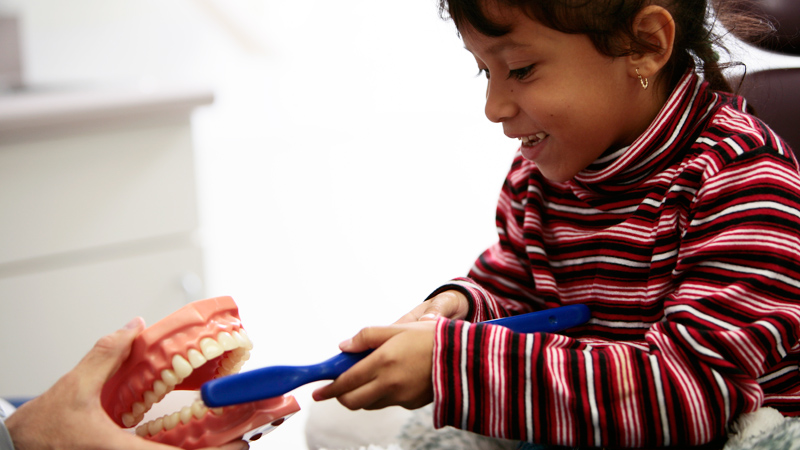
Before Your Visit
A visit to the Koppel Special Care Dentistry Clinic is very different from that of a typical dental clinic. Becoming our patient is unlike most dental clinics, we must determine your eligibility to be seen at our clinic with a phone interview.
This phone interview goes over the following topics:
- Insurance
- Health issues
- Asthma
- Heart problems
- Diabetes
- Allergies
- Medications
- Prior surgeries
- Sleep apnea
- Problems with general anesthesia
- Patient information (age, sex, conditions)
If you have any health issues, you will be asked to schedule a screening at our clinic. These take place in the afternoon, Monday through Wednesday.
During Your Visit
The following describes the process of a typical visit to our clinic:
-
Check-in
When you first arrive at your check-in time, you will need to sign-in and fill out paperwork. The front office will process your paperwork, determine your insurance coverage, and collect your co-payment, if applicable. When this process is completed the patient's chart will be passed onto the preoperative nurse and you will wait to be called for the medical examination.
-
Medical examination
Patients are escorted to a private room where they will receive a physical examination from one of our doctors. The preoperative nurse will also be present, assisting the doctor with the examination and taking the patient's medical history.
-
Anesthesia consultation (pre-op)
After the medical examination is complete, the dentist will conduct their evaluation, ask questions about the patient's medical history, and explain the process and risks of general anesthesia. The resident will answer any questions about general anesthesia. After the consultation, the patient will need to sign a consent form in order to receive anesthesia.
-
Operating room set up
Once the proper paperwork, consents and examinations are complete, the operating room is prepared for treatment. You will again be asked to wait during this process.
-
Induction anesthesia
When the room is ready, you will be brought back to the room to begin anesthesia. Parents and caregivers are allowed to be in the room as the patient falls asleep, but must leave the room before treatment begins.
-
X-rays/exam/treatment plan
Shortly after the anesthesia takes effect, the parents and caregivers will be asked to return to the waiting room. At this time the patient will receive further examinations, including x-rays to determine the course of treatment.
-
Parent consent/consultation
Before the dentists begin with the treatment plan, they will meet with the parent/caregiver to discuss the treatment plan options and ask for further consent to perform the treatment plan as discussed.
-
Procedure
After consent is received, the patient will immediately receive treatment. It is important that this process goes as quickly as possible to reduce the amount of time the patient is under anesthesia.
This will take several hours, be prepared for a long visit.
-
Recovery
Immediately after the treatment is finished, the patient will be transferred to the recovery room. Here the patient will be monitored before they are discharged. Parents/caregivers will be allowed into the recovery room when the patient begins to wake up. During this time the nurse will inform the parent/caregiver on how the procedure went and provide any care instructions they will need to follow. All questions will be answered.
-
Discharge
Upon discharge, the patient will be taken out of the recovery room on a wheelchair and parents/caregivers will receive post-operative care instruction manuals. The nurse will also accompany the patient to the vehicle and help you transfer the patient from the wheelchair.
After Your Visit
Typical Symptoms After Anesthesia
After undergoing anesthesia, there are some very normal symptoms that you should be aware of. If you your child/client experience any of the following symptoms, there is no cause for concern:
- Low grade fever (less than 101 Fahrenheit)
- Dental discomfort
- Nausea/vomiting (mild)
- Bleeding (minor)
- Red/swollen face (mild)
- Grogginess/lethargy for six to eight hours after procedure
Please call us immediately if you experience more severe symptoms like:
- A fever in excess of 101 Fahrenheit
- Difficulty breathing
- Dizziness
- Blurred vision
- Excessive discomfort that you cannot control with pain medication
- Excessive vomiting (more than three times post-op)
- Bleeding that you cannot control by biting on gauze
- Increased swelling after the third day following your surgery
When you call, please ask for the dentist on call. Please feel free to contact us if you have any additional concerns or questions.
